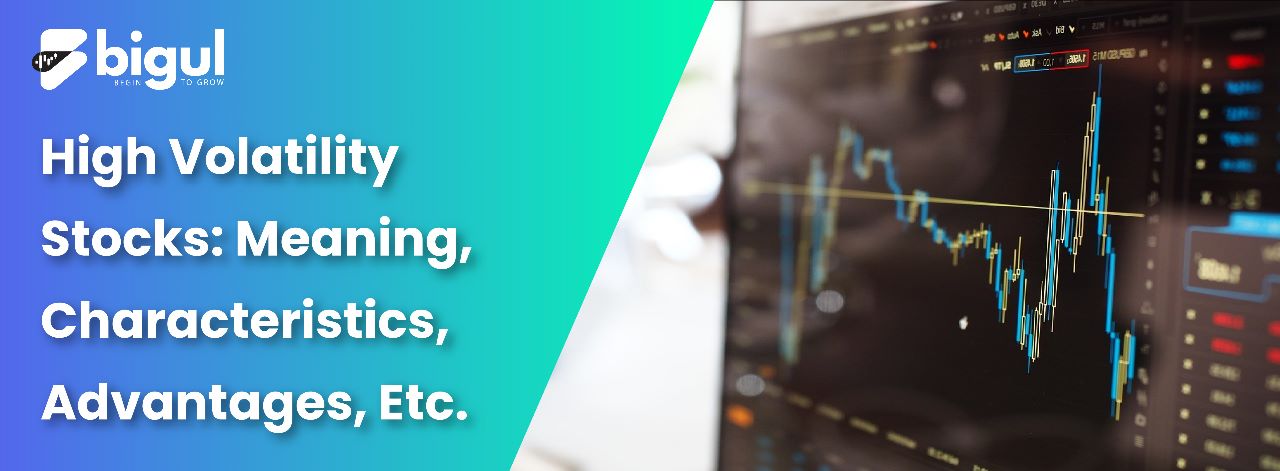Imagine, you’ve decided to dip your toes into the world of investing, eager to witness your money grow.
But as you step into the unpredictable realm of the stock market, you encounter a rollercoaster ride of emotions driven by high-volatility stocks. These stocks have significant price movements that can excite or frighten you.
This article will explain high-volatility equities, risks, and potential rewards for adventurous investors like you. Also, we will provide you with a list of volatile stocks.
So, Let’s buckle up and navigate this thrilling journey together.
What are High Volatility Stocks?
High-volatility stocks are known for their significant and frequent price fluctuations within a relatively short period. These stocks experience rapid price changes, swinging upward and downward with heightened frequency compared to the broader market or low-volatility stocks.
A stock’s volatility is commonly quantified by its standard deviation, which measures its return dispersion across time. High-volatility stocks have higher standard deviations, indicating greater price volatility.
Various factors contribute to the volatility of these stocks. Here are some of them:
- Market sentiment
- Economic conditions
- Company-specific news
- Industry developments
As a result, high-volatility stocks can offer enticing profit potential to investors willing to take on higher risk. Still, they also pose a considerable challenge due to their susceptibility to sudden and sharp price swings.
Investors interested in these stocks must be cautious, conduct thorough research, and implement effective risk management strategies to navigate this turbulent yet potentially rewarding investment terrain.
How to Identify Volatile Stocks
Beta is a widely used measure in finance to assess a stock’s volatility concerning the overall market. Beta values help investors and traders classify stocks into three types based on their volatility:
- Beta = 1: A stock with a beta value of 1 indicates that its price movements mirror the overall market. It is considered relatively safe and is expected to have proportional fluctuations in the broader market.
- Beta < 1: When a stock’s beta value is less than 1, it implies that the stock is less volatile than the overall market. Such stocks tend to be more stable and have smaller price swings than the market.
- Beta > 1: Stocks with a beta value greater than 1 are considered volatile. They experience wider price swings than the overall market, making them more susceptible to market fluctuations.
Volatile stocks with beta values above 1 can present both opportunities and risks for investors and traders. The uncertainty surrounding these stocks due to their susceptibility to market changes can create significant price movements.
This volatility creates attractive investing and trading possibilities for individuals who can precisely foresee and capitalise on stock price changes.
What are the Characteristics of High Volatility Stocks?
There are main characteristics of high volatility stocks. Here are some of them:
- Price Swings: High-volatility stocks experience significant price swings on a regular basis. These swings can be both upward and downward and are often much larger than those seen in more stable stocks.
- Rapid Price Changes: Volatile stocks can see their prices change rapidly, sometimes even within a single trading session. This makes them attractive to traders who seek short-term opportunities.
- Beta Value: Beta measures a stock’s sensitivity to market movements. High-volatility stocks typically have beta values greater than 1, indicating they tend to move more significantly than the overall market.
- Higher Risk: Investing in high-volatility stocks comes with higher risk. The price swings can result in substantial losses, and the stock’s value can drop quickly.
- Less Stable Earnings: High volatility stocks often belong to companies with less stable earnings and business models. These companies might be experiencing rapid growth, intense competition, or industry-specific challenges.
The characteristics of High volatility stocks are not just limited to these. However, there are other characteristics, such as News sensitivity, Lower liquidity, Attracting speculative investors, not suitable for all investors and potential for high returns.
Advantages of High Volatile Stocks
High Returns High volatile stocks have the potential to generate significant returns over a short period. As their prices experience wild fluctuations, investors can capitalise on favourable market movements, leading to substantial gains. These stocks offer enticing opportunities for those seeking to grow their investments rapidly.
- Lower Costs: The market sometimes neglects high-volatility equities due to their unpredictability. Thus, investors can acquire these stocks at a bargain and potentially profit when the price rises.
- Lower Demand in the Market: High-volatility stocks are often associated with smaller companies or emerging industries, which might not have garnered significant attention from mainstream investors. This lower demand can create opportunities for savvy investors to identify undervalued stocks and benefit from their growth potential.
- Fall in the Market Value: While highly volatile stocks can present risks, they can also create opportunities during market downturns. When broader market sentiment turns negative, these stocks may experience sharper declines. Still, they could rebound just as rapidly when conditions improve, offering attractive buying opportunities for investors looking for potential value stocks.
- Suits All Investment Goals: High volatile stocks can cater to various investment strategies and goals. For aggressive investors seeking substantial growth and are comfortable with higher risks, these stocks align well with their objectives. At the same time, allocating a portion of their investments to highly volatile stocks can be a strategic choice for those who prefer to balance their portfolio with high-risk, high-reward assets.
List of High Volatile Stocks in India
Having explored the realm of highly volatile stocks, let’s delve into a curated list of some most captivating ones, each offering unique opportunities and potential rewards.
- KM Sugar Mills
- Sun Pharma
- Magma Fincorp Ltd
- 3i Infotech Ltd
- Jubilant Industries Ltd
Conclusion
High-volatility stocks present a double-edged sword in the world of investing, exposing investors to heightened risks, uncertainties and trading opportunities. Understanding the implications of their beta values and conducting thorough research is essential for those considering these stocks. Prudent risk management and a long-term perspective will be the guiding beacons for navigating this thrilling yet challenging investment avenue.

.jpg)

.jpg)




.jpg)


